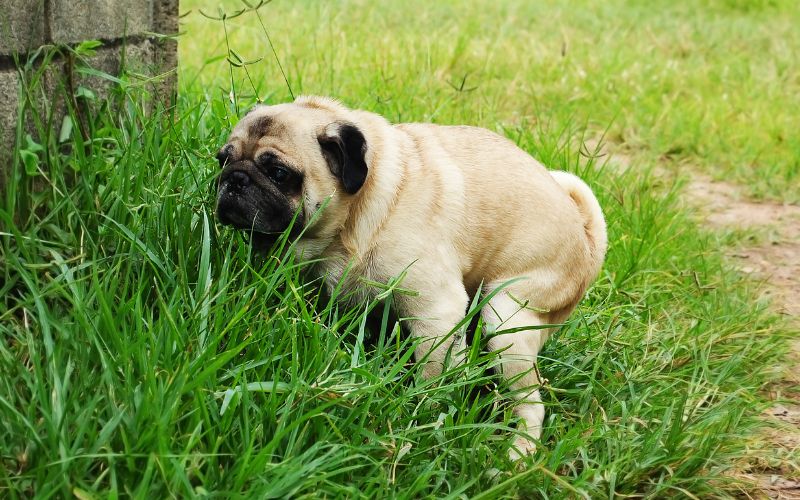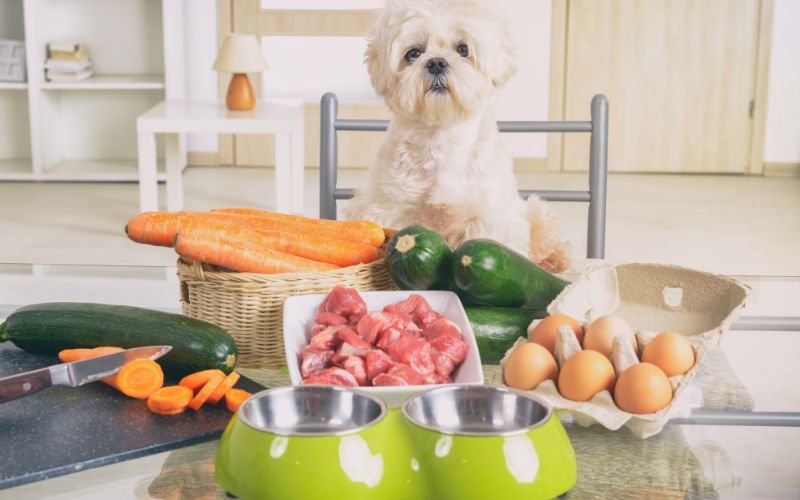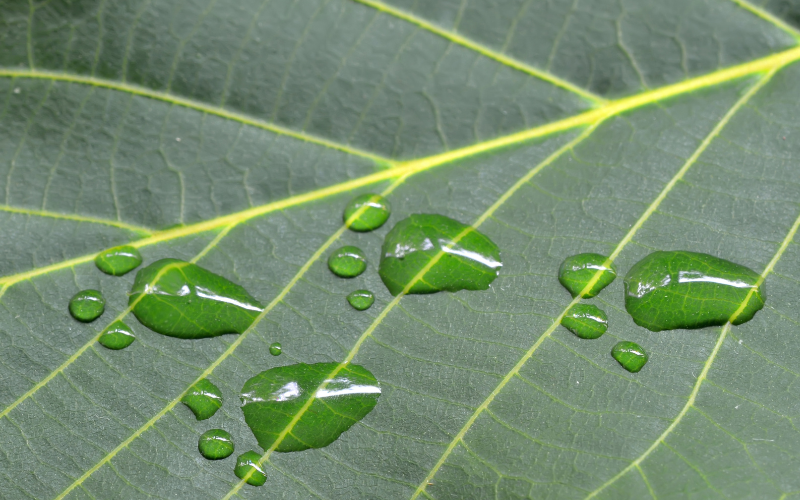Any parent, whether caring for a human or fur baby, is going to be obsessed with their poo. Have they gone today? When did they go? What did it look like? Does it look okay?
Like it or not, poop is one of the main ways we can keep an eye on our dog’s health - the colour, smell and consistency can be a first hand indicator into the health of our pups and whether something might be amiss inside.
Now, we know it’s not the most pleasant topic, but there is no shame here! Being aware of what is healthy and unhealthy when it comes to dog poop will help you to keep on top of your furry friend’s health and wellbeing.
In this blog we’re going to take you through the telltale signs of healthy and unhealthy dog poop, how it should look and what to do if you notice changes in your dog’s toileting habits.
So without further ado, let’s get started.

Signs of healthy dog poo
A healthy dog poo should be firm, but not too hard, as well as slightly moist. It should leave a slight damp spot on the concrete (or wherever they have chosen to go), but there should be no residue, i.e no poop should be left behind.
While a healthy dog poo should be pretty well formed, the dog should not need to strain too hard to get it out, and they definitely shouldn’t be experiencing any pain or discomfort when pushing. The poo shouldn’t have a strong or offensive odour - beyond smelling like ‘poo’.
It can help to think about your dog’s bowel movements the way you think about your own: if you are going regularly and the stool is firm and passes with ease, then things are usually running pretty smoothly inside.
However if you are experiencing cramping or discomfort, you are passing stool more regularly or not at all, the stool you do pass has an abnormal consistency or odour, then it might be time to get checked out.
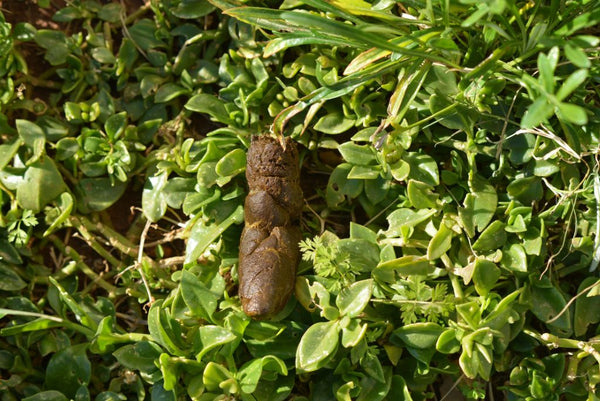
Signs of unhealthy dog poo
When it comes to unhealthy dog poo, there are few more things to look out for that can indicate your dog’s bowels may be unhappy:
The crusty poo
Dry and crusty dog poo can be a sign that your dog’s digestive system may be in some distress. Dogs who are fed a lot of bones in their diet can be prone to drier poos, and particularly dogs fed on commercial pet food can suffer from this too. This can be because of certain add-ins in dog food, such as additional calcium in processed dog food and kibbles.
A high intake of calcium can lead your dog to have poos which are chalky, dry and crumbly, and may even be white. This is a sign of calcium overload, and your dog may need a few more grains and vegetables to help loosen things up a bit. Not only can too much calcium affect their poop, it can also interfere with zinc absorption, which can lead to an unhealthy chain of issues.
Just like humans, dogs require good gut health in order to thrive. We need to nurture the good bacteria growth in their bowels so adding more fibre into their diet can help with regularity and smoothness of pooping habits.
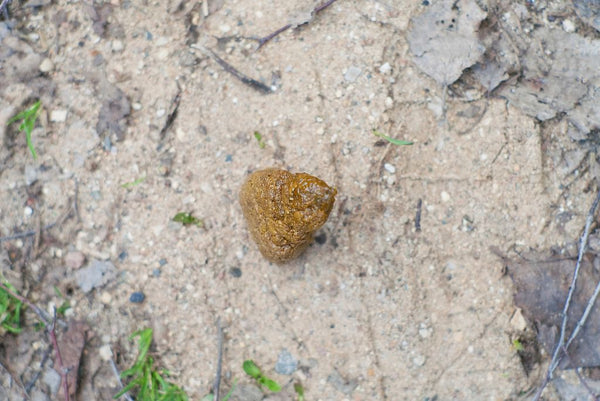
The sloppy joe poo
We have all experienced the runs, the jelly belly, the trots - if you will. It isn’t fun, and when your dog is struck down with this affliction it can be a sure sign that something is up with their gut health.
Runny poo in dogs can be caused by any number of things, from irritable bowel, irritable gut, food intolerance, to anxiety and stress, to more serious underlying health conditions. This means that treating the issues can be a little complicated, but it all starts with getting their diet right, and thus building up a healthy tolerance and good gut bacteria.
If the issue is intermittent then it can be a little easier to isolate certain triggers and get an idea of what might be causing the problem. If this issue persists and doesn’t seem to be sorting itself out on its own, always seek professional advice from your vet.
Blood in dog’s poo
Blood in your dog’s stool is a big red warning flag that something more serious could be going on. If you see bright red streaks or spots of blood in their poo this is often down to excessive straining and is usually harmless, however if the issue persists or you are at all worried then seek medical advice.
If your dog’s poo is black then this could be a sign of digested blood, meaning the blood has somehow gotten into the stomach. And if their poo is loose and has congealed or jelly-like blood in it, then this could point towards inflammatory diseases such as colitis.
If your dog’s toileting problems are partnered with other symptoms such as vomiting, this could be cause for greater concern and should be investigated immediately. Likewise, if you notice your dog’s poop has significantly changed colour, particularly if it is green or accompanied by mucus, this is another reason to have a trip to the vet’s office.
Likewise, if there is an issue with the consistency of your dog’s poo that doesn’t resolve in a day or two on a lighter diet, then again we’d suggest a trip to the vet.
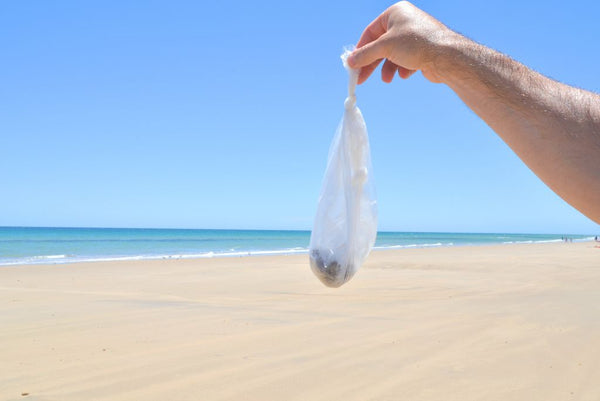
My dog’s poop is soft - what should I do?
If your dog’s poop is too soft, one of the first things to try is to strip back their diet to the simple and easily digestible basics.
Turkey and pumpkin, with a small amount of physillun fibre, are often good foods of choice to help get your dog’s unsettled stomach back to normality, and the addition of salt and onion-free stock can be a great way to rehydrate your canine after a bout of the runs.
Something we also add in for our dogs when they are poorly is about ⅛ teaspoon of slippery elm (this can be increased for heavier dogs, however always do your research or ask your vet before giving this to your dog), as this can really help heal the gut lining.
Our Wellbeing Essentials Complete 22 blend is also a great way to help stabilise and heal your dog’s gut, adding pre and probiotics into your dog’s daily diet as well as good dietary fibres to promote healthy poops.
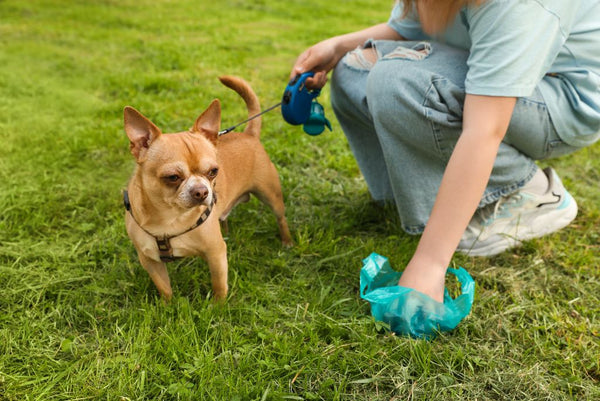
In Conclusion
Of course this is a broad topic and each dog is an individual so will have different symptoms and needs, but knowing the basics or doggy bowel movements can help you identify problems quickly and get your pooch the treatment they need.
Remember, if you ever feel concerned or in doubt about how to support your canine’s gut health and improve the quality of their poo, talk to a trusted holistic vet who will be able to offer personalised advice.

